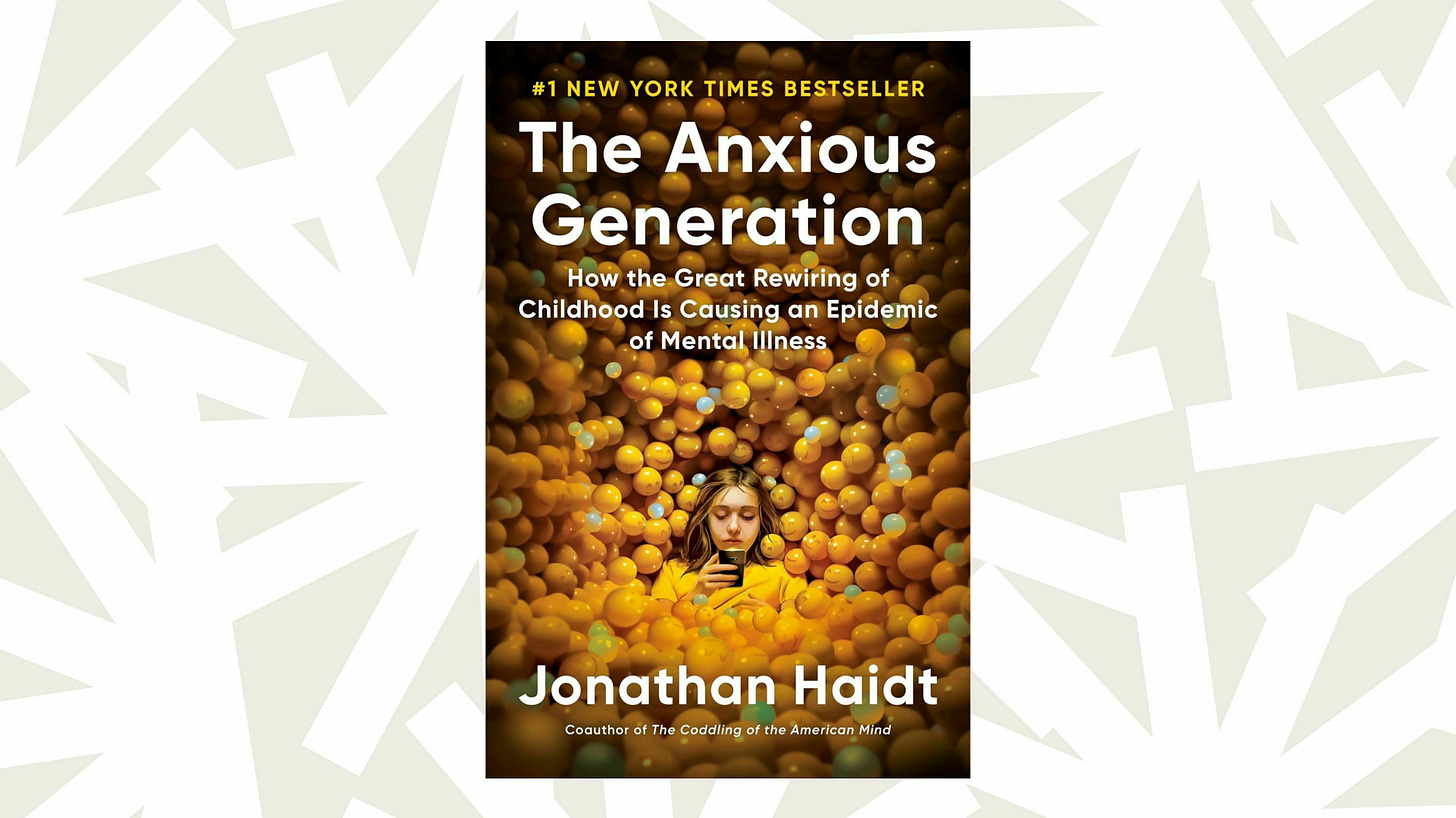I should not be left to my own devices
they come with prices and vices. Reflecting on The Anxious Generation
I had an embarrassing revelation after reading The Anxious Generation by Jonathan Haidt.
The head of my son’s school required all parents to read the book over the summer. So, I listened to the audiobook on a long drive back to Florida.
As I cruised through farmland and Walmart towns, I took breaks from the 10-hour audiobook by browsing music suggested by iTunes. I landed on a Taylor Swift playlist I never knew I needed. Her upbeat tracks were like a shot of espresso, and her lyrics about anxiety, depression, and ghosting could’ve been a soundtrack to Haidt’s message.
I have this thing where I get older but just never wiser
Midnights become my afternoons
In the book, Haidt describes how a phone-based childhood is damaging those born after 1995, “the anxious generation.” The book points to the shocking rise of anxiety and depression among Gen Z beginning around 2010, when smart phones and social media took off. His plea to parents? Loosen the reins in the real world and tighten them when it comes to screens.
As I listened, I took mental notes to improve my parenting.
Every hour or so, I felt the pull to make pit stops — not just for gas and bathroom breaks but to check my phone. At every stop, I checked texts, logged onto Facebook, opened Substack, and scrolled X.
When my depression works the graveyard shift
All of the people I've ghosted stand there in the room
By the time I reached Florida, I knew I wanted to write about the book. The next day, I woke up early, went to my coffee shop, and wrote the draft after spending half an hour scrolling social media.
That first draft focused on sympathizing with Gen Z, especially girls, since their rates of anxiety and depression have skyrocketed.
And it’s true: I do sympathize with them. I’ve met 30-year-old men who, from age 14, were immersed in 4chan, an anonymous forum filled with unfiltered content. I have female friends who’ve been sharing selfies on Instagram since the same age. The women had to fend off creeps, while the men had easy access to porn and extremist content, all while their prefrontal cortexes were still developing. On top of that, they grew up in an era of Covid lockdowns, over-medication, and a polarized, less trusting society. I feel bad for them, having been robbed of innocence and now struggling with anxiety and depression.
I should not be left to my own devices
They come with prices and vices
In that draft, I shared that I understand Gen Z’s suffering because I’ve experienced it too — like a World War 1 veteran who knows the feeling of shell shock. I reflected on my political journey through a new lens. Did I self-radicalize by consuming too much content? Were the bouts of irritability and anxiety I experienced between 2015-2020 driven by digital addiction?
In a confessional yet clinical tone, I described how I check my phone first thing in the morning and last thing when I go to bed. How I am glued to my phone when my son plays at the park. How I sometimes open my laptop during breakfast. How I have an app on my phone to control screen time but have resisted setting it up. All of this is true, but the implications didn’t hit me.
I end up in crisis (tale as old as time)
I wake up screaming from dreaming
I offered big-brained ideas about dopamine addiction, digital paternalism, and policies that would take Haidt’s recommendations even further. I coined the term “the Haidt arbitrage” for trading less safetyism in the real world for more safetyism online.
I noted that at least ten of Taylor Swift’s songs reference anxiety. I re-listened to her song “Anti-Hero” after hearing it on my drive.
All of this was in the spirit of empathizing with Gen Z, like a favorite guncle saying, Oh honey, I feel your pain.
Later that evening, I uploaded the draft to Substack, hit preview, and declared victory on my review essay.
But then, after putting my kid to bed, I scrolled my phone for an hour. Then two hours.
With glazed eyes and a fried brain, a revelation finally hit me like an alert from the universe: How can I prevent my kid from becoming a digital zombie when I am a digital zombie?
Who am I fooling?
It's me. Hi. I'm the problem, it's me.







...why do we still call them "phones"?...